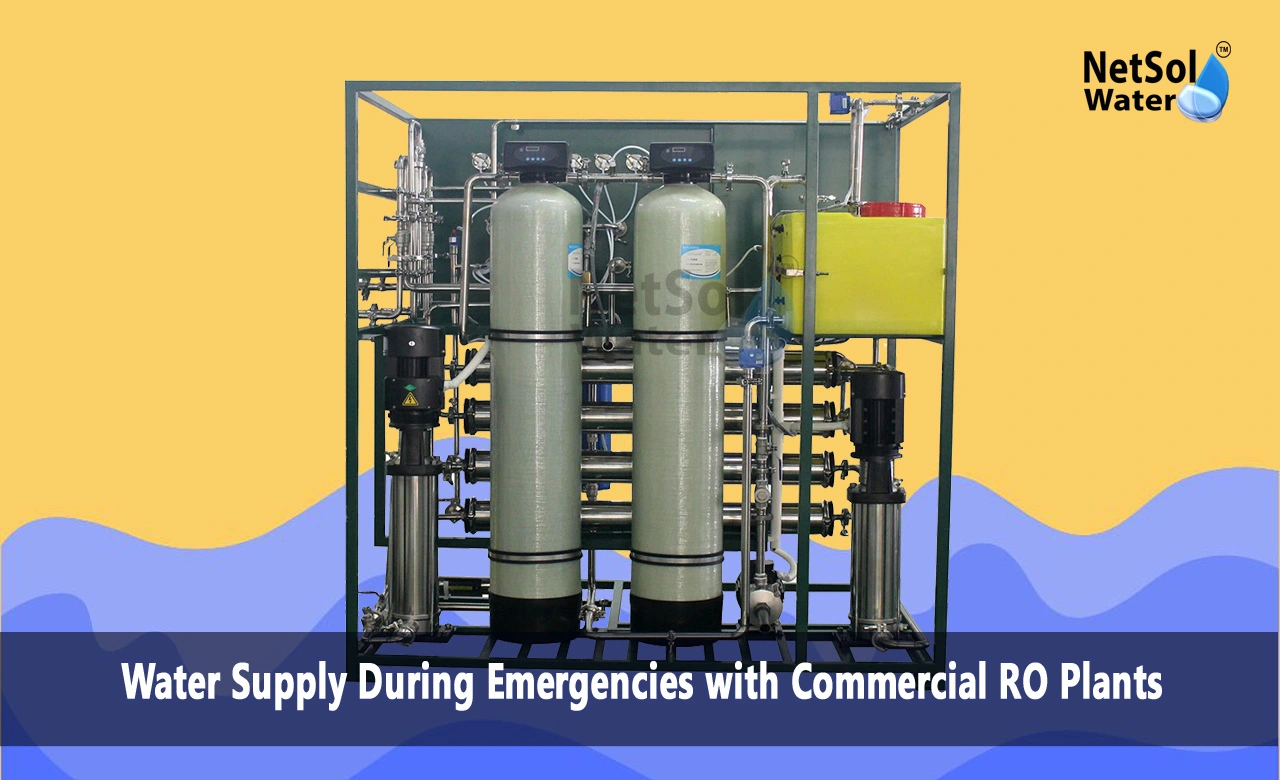Water Supply During Emergencies with Commercial RO Plants
Water is an essential resource for life, and its availability is crucial for households, industries, and communities. Commercial RO plants play an essential role in providing clean and safe drinking water to various sectors. However, emergencies such as natural disasters, power outages, or equipment failures can disrupt the normal operations of these plants, potentially leading to water shortages. In this blog, we will explore the strategies employed by commercial RO plants to ensure a reliable water supply during emergencies.
Strategies Employed by Commercial RO Plants
Backup Power Systems
Power outages can bring commercial RO plants to a standstill, compromising their ability to produce water. To mitigate this risk, many plants have implemented backup power systems, such as generators or battery banks. These systems are designed to kick in automatically when the primary power source is interrupted, ensuring that the plant continues to operate without disruption.
Generators are a common choice for backup power systems in commercial RO plants. They can be fueled by diesel, natural gas, or propane, and are capable of providing the necessary electricity to run the plant's equipment. Regular maintenance and fuel monitoring are essential to ensure the generators are ready to operate when needed.
Battery banks, on the other hand, provide a more environmentally friendly and cost-effective solution. These systems store electrical energy in large arrays of rechargeable batteries, which can be used to power the plant during emergencies. While battery banks have a limited runtime, they can provide sufficient power to maintain critical operations until the primary power source is restored or additional backup measures are implemented.
Emergency Water Storage
Another strategy employed by commercial RO plants is the establishment of emergency water storage facilities. These facilities are designed to hold large quantities of treated water, ensuring that a reliable supply is available during emergencies or periods of high demand.
Emergency water storage can take various forms, such as elevated tanks, ground-level reservoirs, or underground cisterns. The choice of storage method depends on factors like the plant's capacity, geographic location, and terrain conditions.
By maintaining emergency water storage, commercial RO plants can provide a buffer against potential disruptions in water production. This stored water can be distributed to customers or used to maintain essential operations until normal production resumes.
Redundancy and Backup Equipment
To further enhance reliability, commercial RO plants often implement redundancy measures and maintain backup equipment. Redundancy involves having multiple components or systems that can perform the same function, ensuring that if one component fails, others can take over seamlessly.
For example, a commercial RO plant may have multiple pre-treatment units, RO membranes, or high-pressure pumps. If one unit fails, the others can continue to operate, minimizing the impact on overall water production.
Backup equipment, such as spare membranes, pumps, and filters, are also kept on-site or readily available. In the event of equipment failure, these backups can be quickly installed, reducing downtime and ensuring continuity of operations.
Emergency Response Plans and Training
Effective emergency response planning and regular training are crucial for commercial RO plants to handle emergencies efficiently. These plants typically have comprehensive emergency response plans that outline procedures for various scenarios, such as natural disasters, equipment failures, or contamination incidents.
Regular training sessions are conducted for plant personnel to ensure they are well-prepared to respond to emergencies promptly and effectively. These training programs cover topics such as emergency response protocols, safety measures, and the operation of backup systems.
Additionally, commercial RO plants often collaborate with local authorities and emergency services to coordinate response efforts during emergencies. This collaboration ensures that the plant can access external resources and support when needed, further enhancing its ability to maintain water supply during critical situations.
Maintenance and Monitoring
Preventive maintenance and continuous monitoring are essential for commercial RO plants to minimize the risk of equipment failures and ensure reliable operations. Regular inspections, equipment servicing, and predictive maintenance techniques help identify potential issues before they escalate into emergencies.
Advanced monitoring systems, such as SCADA (Supervisory Control and Data Acquisition) systems, are often implemented in commercial RO plants. These systems provide real-time data on various plant parameters, including water quality, flow rates, pressure levels, and equipment performance. By closely monitoring these parameters, plant operators can detect anomalies early and take corrective actions to prevent disruptions.
Furthermore, many commercial RO plants employ remote monitoring and control capabilities, allowing operators to monitor and manage the plant's operations from offsite locations. This feature can be particularly useful during emergencies when physical access to the plant may be limited or unsafe.
Conclusion
Ensuring a reliable water supply during emergencies is a critical responsibility for commercial RO plants. By implementing strategies such as backup power systems, emergency water storage, redundancy measures, comprehensive emergency response plans, and rigorous maintenance and monitoring practices, these plants can minimize the impact of disruptions and continue providing essential water services to their customers. Ongoing investments in advanced technologies, employee training, and collaboration with relevant stakeholders further enhance the resilience of commercial RO plants, solidifying their role as reliable providers of clean and safe water, even in the face of emergencies.
Do you need an advice or assistance on selecting the best water and waste water treatment unit? We have solutions for all your problems!
Let us know your problem, our experts will make sure that it goes away.
For an assistance or related query,
Call on +91-965-060-8473 Or write us at enquiry@netsolwater.com



